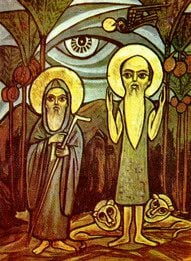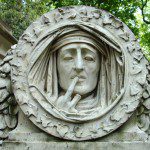![Soul leaving body by William Blake [Public domain], via Wikimedia Commons](https://wp-media.patheos.com/blogs/sites/637/2017/06/Illustrations_to_Robert_Blairs_The_Grave__object_9_The_Soul_Hovering_over_the_Body-300x212.jpg)
Abba Anthony said, “I believe that the body possesses a natural movement, to which it is adapted, but which it cannot follow without the consent of the soul; it only signifies in the body a movement without passion. There is another movement, which comes from the nourishment and warming of the body by eating and drinking, and this causes the heat of the blood to stir up the body to work. That is why the apostle said, ‘Do not get drunk with win for that is debauchery.’ (Ephes. 5.18) And in the Gospel the Lord also recommends this to his disciples: ‘Take heed to yourselves lest your hearts be weighed down with dissipation and drunkenness.’ (Luke 21.34) But there is yet another movement which afflicts those who fight, and that comes from the wiles and jealousy of the demons. You must understand what these three bodily movements are: one is natural, one comes from too much to eat, the third is caused by the demons.”[1]
This saying can be seen coming from the letters attributed to Anthony, helping establish the authenticity of the letters themselves. Whether or not Anthony personally wrote his letters with his own hand, or he had them dictated, their contents were known and remembered by the monastic community and recorded in the Sayings material, showing that it was something which was well remembered as being something Saint Anthony had explained. Finding this saying connecting with his letters therefore eliminates many of the doubts which would otherwise emerge concerning their authenticity, making this saying a useful text in trying to understand the full legacy of Anthony’s beliefs and practices.[2]
Anthony, concerned about the relationship between body and soul and the way the body often seems to have an inordinate control over the way a person acts, indicated that we should seek to understand our body and its impulses so as not to be misdirected by them and to act inappropriately. Our body influences us, but if we do not understand the proper relationship between our body and soul, and instead let our body have an unbalanced control over how we act, then we will be limited by its impulses; therefore, we must find a way to discern our spiritual nature and let our soul work with the body and have them both direct us in a holistic fashion.
The body is itself not to be seen as bad; rather it is a good servant of the person, indeed, a central part of who they are, but if they limit themselves to what they see and experience with their body, their spiritual nature will be malnourished and they will suffer a great loss as a result. Yet, because the body is good, its natural impulses must also be seen as good; good, but incomplete without integration from our spiritual side. For this reason, Anthony first felt it necessary to discuss the natural impulses of the body. They are those aspects of the body which the body does by itself, from the sensual indications it gives to the person for them to ponder as they decide how they shall act, to those reflective, unconscious movements which the body does by itself unless we make a conscious effort to direct them (such as when we breath). In and of themselves, they have no moral value; they are neutral, neither good nor bad; but if someone became attached to them, and heightened them, making them unbalanced, then they could be turned against their natural goodness and become something unnatural and therefore, contaminated by willful sin; thus, if someone developed an attachment to some of them, to the pleasures they offered, they could then turn a natural good into an excessive good which actually becomes an evil (such as those who embrace the desire to eat to become gluttons: they take the natural need of nourishment, and the pleasure of eating, to excess, turning the good of the body against itself).
This, then, directs us to the second form of influence our body can have upon us. We move from the natural balance and harmony its impulses are to give us to something unnatural and therefore oppressive. Drinking is good, and even a little wine can be good for the body and help provide cheer for the soul; too much wine, too much of a good thing, becomes an attachment which not only forms habits which hinder our activity, but they become influential upon us as a whole person. That is, they begin to hinder our mind, our inhibitions which the mind has placed to help keep the body under control. Thus, those who drink an excess amount of alcohol will find their reason and therefore their actions distorted by the excessive imbibing of the spirits; they will act differently than normal, thinking in ways which they would not otherwise think when they are sober. Likewise, other inordinate engagements with the body will turn what is natural away from that nature, as the proper personal balance between body, mind and soul is lost. The key is to see how the process begins naturally but ends up with the body, itself, no longer acting in harmony with itself, only allows elements of its desires to have control of how we act, and the body itself leads itself away from its own natural good even as it then directs us against our own good nature and into sin.
Finally, there are outside influences, things which can influence the mind and body, causing a disorder in us and so lead us to possess an ill-will. For Anthony and those who lived in his era, these forces were said to be demonic powers, the dark chaotic forces which thrive in sin. These powers, often seen to be spiritual entities who had been give power and authority over various material forms before turning evil and falling from grace, were seen to possess elements of that power after their fall, and so were capable of influencing our bodies in accordance to those material forms they had power to direct. Science, not knowing them as spiritual powers, still detects the influence of these powers in the chemical imbalances which influence the mind, or as external pressure such as through hypnotism or group psychology, each able to affect the personal will and cause disordered activity as a result. Social media demonstrates how such external influences can influence how we think, the emotions we get, and therefore, how we act as a response. If we do not turn away from those influences, they can control us, and so they could be said to possess us, whether or not we want to label them as demons.

Ethiopian Icon of Saint Anthony the Great And Saint Paul of Thebes via Wikimedia Commons
Anthony, seeing the way the body can be a source for imbalance in our lives, did not want us to ignore or reject our body, but he felt it necessary that we found a way to have it holistically work with the whole of our person, so that with it, we can live rightly in the world. This meant that when the body, for one reason or another, was inordinate in its influence, we would have to struggle against its impulses, finding where they are excessive and against our nature, and where they are good and right and should be followed. This means that in our self-discipline, we end up getting to know ourselves, knowing truly who and what we are, apart from all other influences upon us, so that in that detachment, we can then will properly and open ourselves up to the direction of the Spirit of God to not only return to our original nature, but to transcend ourselves and become adopted children of God. Realizing the imbalance which we have created for ourselves means we see the habits which we have created for ourselves, habits which reify the unholistic approach to the world, and so we discern what we are up against, those habits which we must overturn if we want to return to our proper natural balance. This is what asceticism is about, finding ways to gain control over ourselves, in and through our own will, instead of being controlled by the desires of the flesh and the habits which they have already formed in us. Certainly, Anthony did not think this could be done apart from the Spirit, apart from grace, but without striving to attain such purity of mind and body, without cooperating with grace, the unnatural imbalance will remain.
It is therefore a sickness which we find ourselves in, as the proper mind-soul harmony has been lost, and in that loss, external influences can manipulate and harm us making us that much worse off. “And now, my beloved children,” Anthony writes in his letter, continuing after what the Saying recorded, “if the soul exerts itself and preserves in the testimony which the Spirit bears within the mind, both soul and body are purified from this kind of sickness. But if in regard to these three motions the mind spurns the testimony which the Spirit bears within it, evil spirits take authority over it, and sow in the body all the passions, and stir up and quicken strong war against it; till the soul grows weary and sick, and cries out and seeks from whence help may come to it, and repents, and obeys the commandments of the Spirit, and is healed. Then it is persuaded to make its rest in God, and that He is at peace.”[3]
The goal, then, is to become more spiritualized; that is, to be more attune to the ways of the Spirit. This is done by overturning the influences of bodily concupiscence. It is not that the body is bad, but when the body has no rational ground to direct its impulses, then those impulses war with each other, causing some to gain control over the whole person and lead them directly towards such impulses even if other needs, physical and spiritual, are not being met. The passions which develop come from the pleasures attained through such impulses; the pleasure often is good, which is why it is there, but if all one does is seek such pleasure without restraint, then the person will be attached to a lesser good and not see and know true peace in God. For example, someone who begins drinking wine, enjoys it, and seeks the pleasure of such enjoyment without restraint, they will become addicted to alcohol and end up an alcoholic, with all the harms connected with such an addiction. Likewise, eating can lead to attachment to the pleasure of eating, to gluttony, which slowly harms the body through the accumulation of fat, and the inability to control one’s eating habits can then hinder personal advancement in other areas of one’s life. The harmful side effects connected with such imbalance demonstrate the destructive side of embracing such passions, and what is found in the physical form will manifest the spiritual warfare going on within the mind and will.
The point of this saying, then, is to realize that the body has its impulses, some of which are natural, and are not to be shunned. The body needs to be in a harmonious balance with the mind and soul of the person, so that the person can have as great a freedom in their will and be open to follow the direction of the Spirit towards union with God, where true peace is to be found. Anthony pointed out that the body is not, in and of itself, the problem, and to be denied; the body is not evil, but on the other hand, he reminded us that a person is more than a mere body and so they need to engage the fullness of their being if they want to be free and find themselves attaining the beatitude which alone can grant them everlasting peace.
[1] The Sayings of the Desert Fathers. trans. Benedicta Ward (Kalamazoo, MI: Cistercian Publications, 1984), 6.
[2] The questions emerged as a result of Anthony being said to be unlettered (but that could be merely an indication he could not read and write in Greek, and he could do so in Coptic), as well as the Origenistic tone of many of the letters. Yet, as many of the desert monks connected with Anthony were found among the Origenists, it should not be surprising Anthony himself had Origenist instincts.
[3]St. Antony, The Letters of St. Antony the Great. trans. Derwas J. Chitty (Fairacres, Oxford: SLG Press, 1991), 3 [Letter 1].
Stay in touch! Like A Little Bit of Nothing on Facebook:
A Little Bit of Nothing













